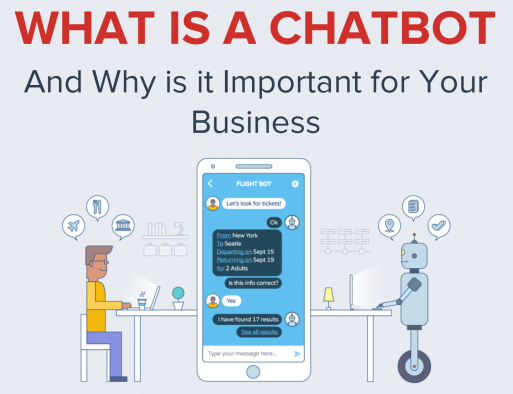The 4 Biggest Trends to Expect for Chatbots in 2018

The year 2017 saw amazing strides in artificial intelligence (AI), machine learning, and chatbots. The effects such innovations have had for everything from retail and customer service to data mining are even now still becoming realised.
Chatbots, through their underlying technology, seek to mimic human interaction with users on websites, mobile apps, and messaging systems. They have potential to reach more customers faster and more efficiently while maintaining high levels of customer engagement and satisfaction.
Here are the four biggest ideas trending for chatbot development in 2018.
1. Voice Skills
Talking to a chatbot instead of typing is on its way in. Considering that consumers’ comfort with speaking to their devices is rising, chatbots are the next platform to take advantage of easing communications with consumers in a vocal manner.
Voice interfaces have great potential for humanizing interactions between users and information sources. While Google’s Alexa and Apple’s Siri have primed the market, they serve as general purpose technology for now. With greater availability of chatbot voice technology, companies have the opportunity to create their own chatbot avatars that are deeply knowledgeable about a company’s goods and services offered.
2. Conversational Interfaces
To date, chatbots have been responding via machine learning applications. The nature of machine learning means how it sounds: the technology learns over time. With the flurry of machine learning chatbots introduced in 2017, look for their responsiveness to improve to human conversational levels as they gather more data.
Conversational chatbots–much like voice interfaces–reduce barriers between users and the services they seek. Conversational chat seeks to produce human-level communication that results in a seamless experience for the user.
With the chatbot doing the work of understanding the conversation instead of the users trying to understand the chatbot, consumers can focus on their interaction with the services provided and achieve higher confidence levels in the information that they seek.
3. Data Mining
Chatbots inherently provide direct consumer information and have vast storage capabilities for that information. Companies are realizing that this mass amount of data is ripe for analysis. By leveraging this new data source, important insights about customer’s questions, needs, and focus will help tailor marketing strategies and improve products and services.
Key takeaways from studies show a rapidly growing market for IaaS (Insights as a Service) applications as companies seek ways to utilize their chatbot’s consumer data.
4. Blockchain
Bitcoin and other cryptocurrencies made a lot of news in 2017. The focus, of course, has been on the currency applications of blockchain technology. Companies are looking to blockchain tech to lock in their clients by developing points systems much like airlines and hotels. The points will live in the chatbot applications, offering users the abilities to exchange points for goods and service and then return to the chatbot again and again to earn more points and make more purchases.
Blockchain tech isn’t limited to cryptocurrencies or analogs like points systems. The technology can protect and secure virtually any kind of information, from personal financial data to medical records. Consumers have become keenly aware of online data security, and value companies that offer a high level of trust. Cryptocurrency chatbots will be offering the same security in their interactions and become secure platforms for users to return to for ongoing engagement with brands.
All of the above innovations have been featured in previous quarterly workshops, masterclasses and roundtables organised by Warwick Business School’s Innovation Network (KIN), with Blockchain being again featured in this year’s programme of events, together with plans for a September workshop on the topic of Augmented Reality applications for knowledge sharing and learning. Watch out for a future blog on this important topic. I’m one of three part-time facilitator’s for this network – more details about the network below.
About KIN
A non-profit practitioners’ network of large, predominantly blue-chip organisations. The network is kept deliberately small in order to foster trust and familiarity and the ability to ‘get behind’ what makes organizational learning and Innovation techniques effective. Having only one organisation from each industry sector, and no consultants or vendors, provides a unique atmosphere of trust and diversity of thinking.
Business value is driven through the development of new insights, real-world research and the sharing of proven practice and tools. Examples of the themes include:
- Organizational learning and Learning from Practice
- Innovation practice
- Knowledge sharing and knowledge retention
- Virtual teamworking
- ‘Enabling’ Technologies (augmented and social media, data analytics, AI etc)
- Communities of Practice
- Social Network Analysis
The Network provides:
- Dedicated Facilitators, working with Member organisations, connecting wants and offers and ensuring connections are developed and insights shared.
- An extensive calendar of Member-only events. This includes unlimited organisation-wide participation in Roundtables, Masterclasses and Webinars; typically one per month. Two free places at our major quarterly Workshops, which include networking dinners and accommodation.
- A content-rich and secure online MemberSpace and a private & secure LinkedIn forum.
- The KIN bi-annual network analysis is our systematic way of identifying and measuring high performing elements within Member organisations. This allows KIN to bridge the competency gap and inform our programme. It also allows member organisations to set measurable innovation and learning improvement targets.
- Access to academic and applied research from the IKON Research Group at Warwick Business School (IKON is the founding body for KIN).
For more details about membership you can either contact me, or email kin@wbs.ac.uk.









One thought on “The 4 Biggest Trends to Expect for Chatbots in 2018”
Thank you for sharing, This blog has really useful information about mobile apps visit here to read more about Chatbot For Customer Service and Support here https://bit.ly/2VyEdBJ